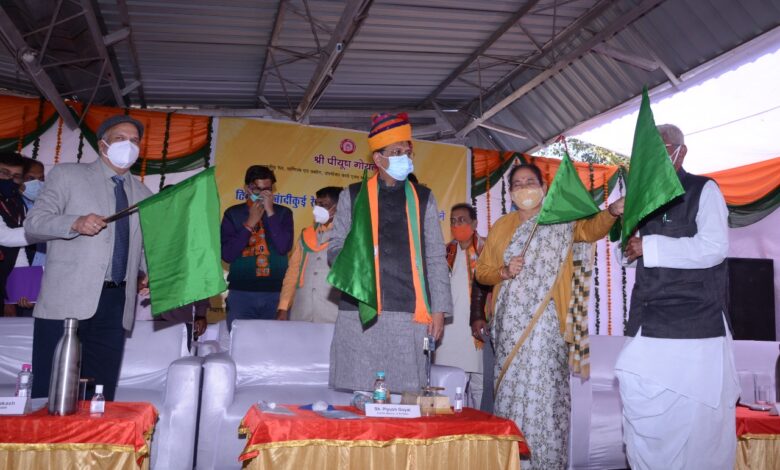Critical section of Dighwada-Bandikui railway route between Ajmer, Delhi electrified

A critical section of Dighwada-Bandikui railway route between Ajmer and Delhi has been electrified, a key step towards making the National Capital Region free from diesel engines.
This will contribute towards making the NCR environment cleaner and greener.

Piyush Goyal, Minister of Railways, Commerce and Industry, Consumer Affairs and Public Distribution, Government of India, flagged off first train on newly electrified Dhigawara-Bandikui section of North Western Railway (NWR).
On this occasion, Piyush Goyal said in his address that today is a very special day that we mark this day before the birth anniversary of Guru Nanak. He said that under the leadership of Prime Minister, Indian Railways is moving forward in a phased manner with fast pace and quality and is making great achievements with everyone’s cooperation, teamwork and motivation. MR said that Rajasthan is a very big state in terms of area and population of the country and the residents of Rajasthan are making significant contribution to the economy by staying in the entire country.
While emphasizing railway works, Shri Goyal said that the electrification work was done on the Kota-Mumbai line in Rajasthan 35 years ago, after that no one paid attention to this area. While working on this in the railways, a target has been set to electrify the entire percentage of railway lines across India. Talking about Rajasthan, he said that till 2009-14, there was 0 km of electrification work in this area which was 1433 km in the last five and a half years (till September 2020) i.e. 240 km route was electrified every year. He said that there has been a change in thinking over the years and there has been a change in the way we work. Today, after the electrification of this line, the route from Rewari to Ajmer has been electrified and now the electrified trains from Delhi to Ajmer will start soon. After running of these trains, the diesel trains will be stopped, which will eliminate pollution as well as the dependence on the fuel imported from outside and trains will be operated from the electricity produced in self-reliant India, this will also save significant revenue. Apart from this, the average speed of trains will increase and there will be development of industries, agro-based businesses and progress of villagers and farmers. To avoid any inconvenience to the farmers, Kisan Rail are being operated by the railways to transport their agricultural products. The government is committed for the progress of farmers.
Regarding the progress on railway works in Rajasthan, Shri Goyal said that the average investment in this sector was Rs 682 crores till the year 2009-14, which has increased 4 times to Rs 2800 crores in the year 2014-20. Similarly, till the year 2009-14 only 65 road under bridges and 4 road over bridges were constructed, whereas in the last five and a half years 378 road under bridges and 30 road over bridges have been constructed, which shows that under the leadership of Hon’ble Prime Minister, people are doing useful work with new thinking and speed. Currently, 7 new line works at a cost of 10,000 crores, 9 doubling works at a cost of 13,000 crores and 3 gauge conversion works at a cost of 4,000 crores are being done in Rajasthan. Special attention is being paid to doubling work, earlier doubling in this area was 41 km per year, which is now being increased to 91 km per year.
Goyal also appealed everyone to follow Covid Protocol, wearing masks, maintain social distancing and take care of hygiene.
According to an official release, the Indian Railways has set a target to complete electrification of its broad-gauge network by December 2023.
Over 66 per cent of broad gauge route has already been electrified. With 18,065 km of electrification, the Railways record an astonishing 371 per cent increase in electrification during 2014-20 period as compared to 2009-2014, it stated.
The railways jas set a target complete balance broad gauge railway track electrification by December 2023.




